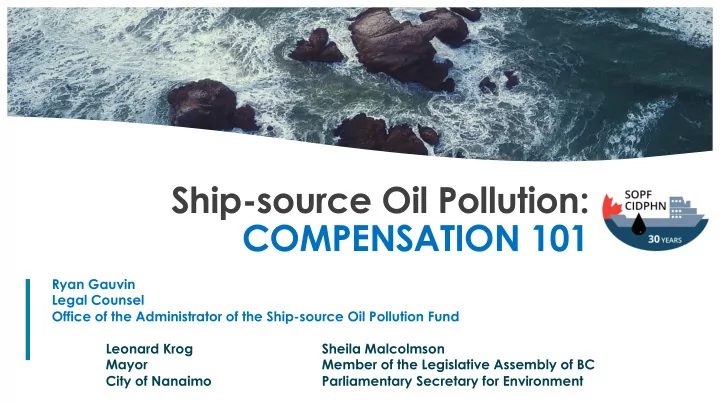

Ship-source Oil Pollution: COMPENSATION 101 Ryan Gauvin Legal Counsel Office of the Administrator of the Ship-source Oil Pollution Fund Leonard Krog Sheila Malcolmson Mayor Member of the Legislative Assembly of BC City of Nanaimo Parliamentary Secretary for Environment 1
You wake up early in the morning to a ringing telephone . . . Photograph credit: Nanaimo News Bulletin 2
The owner of the boat is probably liable for : - So what do you do? 3
I will hear your case ! 4
Leonard Krog, Mayor Immediate and long-term impacts of oil spills on: • Emergency services • Recreation • Tourism 5
We compensate these items too. - 6
The Fund compensates victims of oil pollution by any type of oil from any ship or boat anywhere in Canadian waters. 7
Claims Process • Carefully document any loss, damage, costs, or expenses; • What happened? Narrative referring to documentation; • Submit your claim to the SOPF (within two years, to be safe); • Assessment, offer, acceptance, payment; and • We pursue the polluter, in court where necessary. 8
9
Sheila Malcolmson MLA Nanaimo Parliamentary Secretary for Environment Addressing Abandoned Vessels and Marine Debris UBCM 2019 Convention September 25, 2019 Ship-source Oil Pollution: Compensation 101
Background • Islands Trust Council Chair 2008-14: – AVICC & UBCM abandoned vessel resolutions • MP for Nanaimo-Ladysmith 2015-19 – tabled private member’s bill to address abandoned vessels • MLA for Nanaimo 2019: – Special Advisor for Marine Debris – Parliamentary Secretary for Environment
Abandoned Vessels – Transport Canada and the Province • Transport Canada: – Responsible for removal of abandoned vessels – Wrecked, Abandoned and Hazardous Vessels Act; – Funding available through the Abandoned Boats Removal Program • Provincial Government: – Responsible for waste management / recycling of marine debris
Role of Special Advisor • Make recommendations to eliminate the environmental threats caused by abandoned vessels, look at: – collaboration with the federal government on potential development of a boat-licensing program – feasibility of end-of-life recycling of boats and marine infrastructure, as well as fibre-glass – feasibility of a “cash for clunkers” program for vessels at the end of their useful life – Washington State experience
What We Heard • Ocean health and clean shorelines are vital to our well-being • Coordination with federal agencies and local governments is required for success • The province should play a role in: – Improving prevention and reuse – Expanding recycling opportunities – Ensuring that disposal options are available – Fostering innovative solutions to marine debris
Next steps • Incorporate findings of conversations and site visits into a recommendations report: – Further analyze past UBCM resolutions and BC Chamber of Commerce – Continue to work with agencies, First Nations and other levels of government • Present report to Minister George Heyman for consideration by the end of the year
Remember this? Knowing what you know now… What would you do? Photograph credit: Nanaimo News Bulletin 16
Past Local Governments Claims • Only ten local governments have claimed • Largest compensatory payment to a local government: $394,110.76 (September 2019) • City of Vancouver received $266,014.86 (May 2019) 17
18
Questions? Interested in learning more about the SOPF and our last 30 years? Join our distribution list to be the first to know when our new publications are available! Feel free to contact us at info@sopf-cidphn.gc.ca for more information! 19 19
Recommend
More recommend